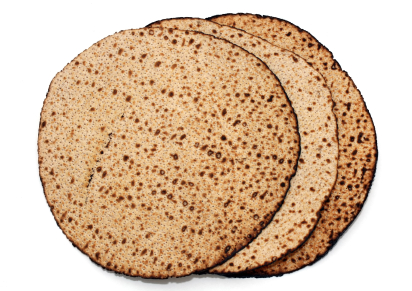What to do when irresistible question meets immovable intellect?
Based on Likutey Halakhot, Pesach #9
Let’s see. For all of Pesach we may not eat bread, cake and cookies and other leavened foods (and beverages, like beer). Everything has to be “kosher for Passover.” Not even an itsy-bitsy speck of leaven! Not so easy to give up our favorite foods, regular eating habits and be so careful. But millions of Jews have been doing it for thousands of years, so we can too.
Also, at the Seder, we have to eat a fair amount of matzah and maror (bitter herb). On the other hand, we get to drink four cups of wine (a mitzvah!) and have nice meal (another mitzvah!). (Obviously, all this to-do on what to not eat and what to yes eat, is all to undo, at least to some degree, Adam and Eve’s having eaten from the Tree of Knowledge.)
Rebbe Nachman teaches that when a Jew eats, one of the spiritual gifts available is ratzon, desire. Desire for what? Desire for God, for closeness to God, desire to do something—anything—to alleviate that ratzon. Eating is something we do fairly often. Why is it so important to constantly refill our desire? Because you never know.
As much as you and I may want to be a good Jews now, we never know what life has in store. Many a newcomer to Jewishness, as well as many born into observance and devotion, runs into experiences that dent or crack his faith. Many experience the experience of unsatisfied spiritual expectations. Many overextend themselves and become Jewishly exhausted. The ratzon runs out. They stop caring about Jewishness, in whole or even in part, God forbid.
I find it impossible to describe the “Wow” of standing ready for another Seder.* Then as it starts and unfolds, the joy of each step, the fun of it—setting up the Seder plate, pouring the wine, breaking and hiding the matzah—and reading the Haggadah, asking the Four (and more) Questions and answering them and…. Hey, wait! We never give a fully-detailed answer to why we do the all the things we do, the way we do them. That, writes Reb Noson, is the essence of our reply to the Wise Son’s, “What are the testimonies, statutes and social laws which Hashem our God has commanded you?”
Telling him that we may not eat anything after the Afikomen is puzzling? What’s it got to do with what he asked?! The essence of the answer is that we aren’t permitted to ask everything. If we would want to understand every detail of the Torah to its ultimate meaning—this is off limits. We cannot understand God’s thoughts. We may ask “until the ends of Heaven,” but not beyond.
We can, and should, investigate the miracles that God has shown us from the Exodus until today, to come to understand His care for us, that He wants us to serve Him, and the right thing to do is accept His sovereignty and live by the Torah as best we can. But beyond that, to try to fathom God’s reasons, we cannot and we may not.
So, really, that “we were slaves to Pharaoh” is an unsatisfactory answer to the Four Questions. And we’ll never really know why on Pesach even a speck of leaven is forbidden, why we can’t even own leaven on Pesach or what tzitzit has to do with the Exodus (Numbers 15:41). The real answer is, “God saved us from a destiny of slavery. We owe Him our lives, so whatever Moshe, His trusted servant, tells us to do we’ll do.
There are limits to asking because there are limits to understanding. And it’s when we’re wanting for an answer that we need to answer with ratzon. This is why the concluding step of the Seder is Nirtzah (from the same Hebrew root as ratzon). No intricate pilpul (intellectual give-and-take), no elaborate theories. Just the joy of singing and praising God for having chosen us.
akosher und freilekhen yom tov!
chag kosher v’sameach!
A kosher and happy Pesach!
© Copyright 2011 Breslov Research Institute
*I can’t thank God enough to have this gift. But I’ll admit, the reality is, at other times during the year I sometimes don’t (can’t!) feel any “wow” in my Jewishness.


1 תגובות
Seltzer and sparkling waters can be a great beverage alternative for Passover. Syfo Beverages has Kosher for Passover seltzer and sparking waters. They’re located in the Southeastern US, but I think you can order online at http://www.syfobeverages.com.